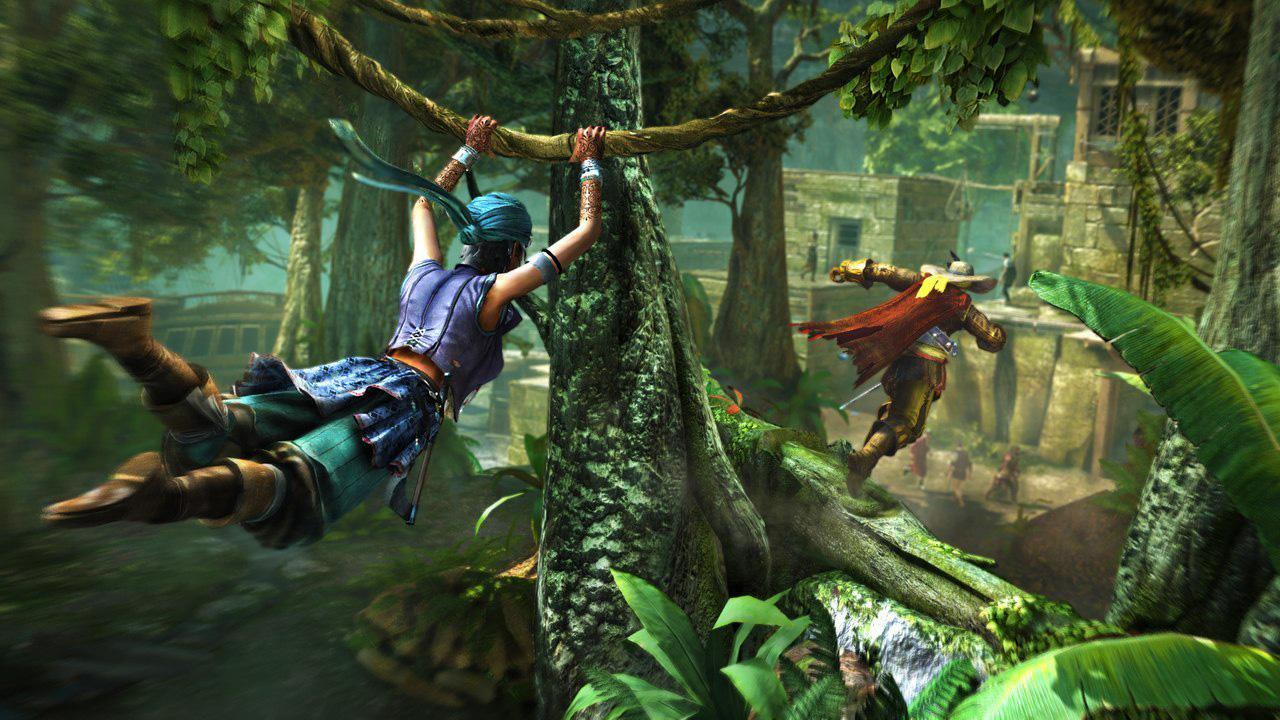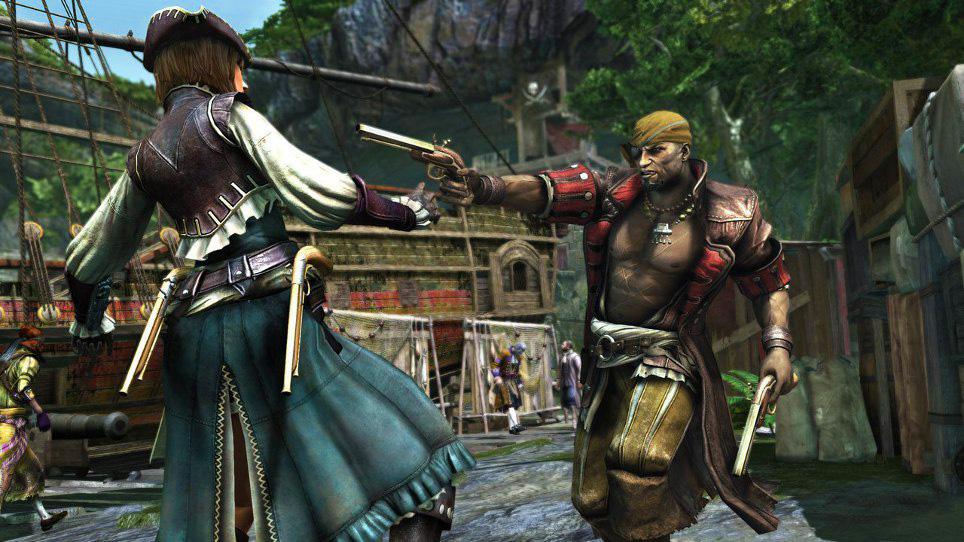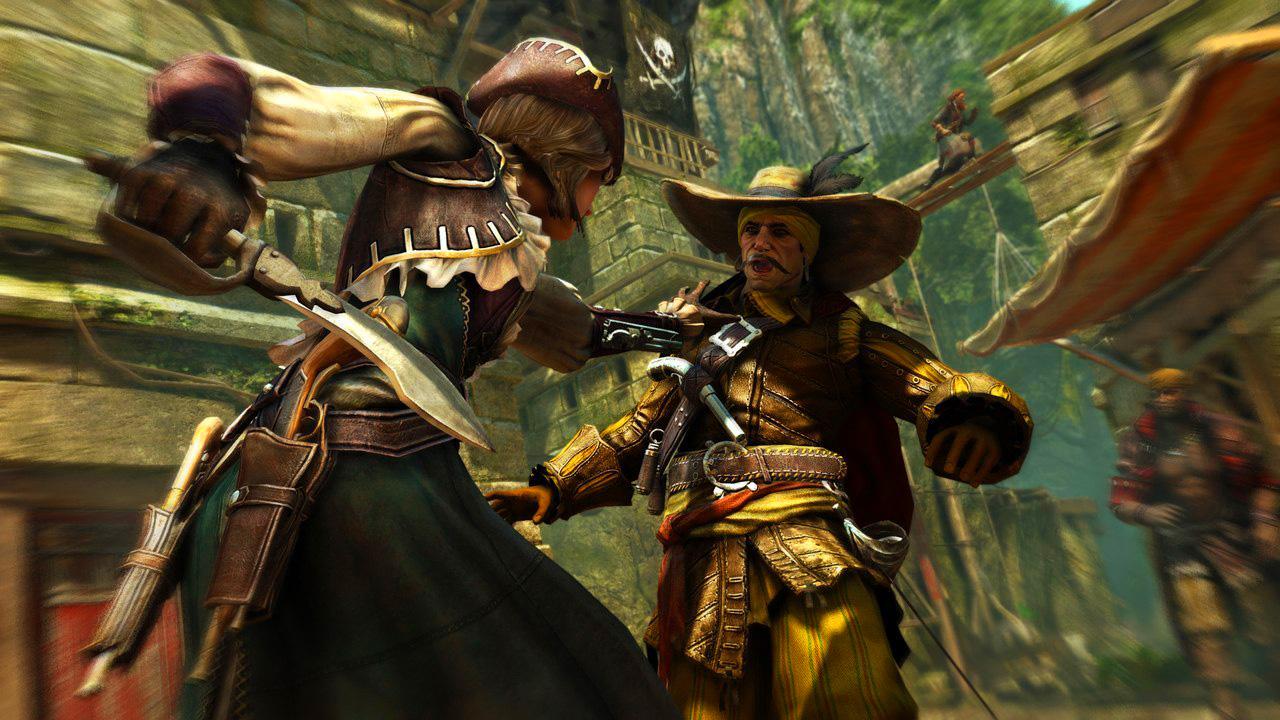
Back in our November 2010 review of Assassin’s Creed: Brotherhood, we noted this about the new multiplayer mode:
“This seems like the type of multiplayer that many will play then put down, while a select group of hardcore fans become ridiculously good and play it all the time. It might have a solid cult following if Ubisoft can keep those select few happy.”
It worked. Nearly three years and three games later, Ubisoft’s creative approach to the multiplayer genre is a success. Those “select few” fans did in deed remain engaged, and Ubisoft wisely chose to cater to them rather than abandoning the mode in favor of a more standardized form of multiplayer. Third-person action games have no shortage of online modes, most typically involving one team or individual running up and shooting the other. The Assassin’s Creed series instead went in a different direction, offering a cat-and-mouse style of gameplay that has been described as a “cerebral deathmatch.” And it is paying off.
You step into the shoes of a killer, are given a target to hunt identified by a picture, then watch the crowd for your human target to stand out and reveal themselves.
“With Brotherhood, it was a very bold step to do a very new multiplayer. It was actually loved quite early by some early adopters,” Lead Multiplayer Game Designer Tim Browne told us. “It is still is loved, it is still played. We can see people playing on servers for Brotherhood. Yes, though the numbers were lower than [multiplayer modes in other games], it still proved popular. We knew we had something very special in the multiplayer that we didn’t really want to change the DNA, the core design.”
The modes have changed, but the concept has remained the same: You step into the shoes of a killer, are given a target to hunt identified by a picture, then watch the crowd for your human target to stand out and reveal themselves – all while you yourself are being hunted. The multiplayer will once again be a big part of the series when Assassin’s Creed IV: Black Flag is released on October 29 for PS3, Xbox 360, and Wii U, and then as a next-gen launch title for PS4 and Xbox One on November 15 and 22, respectively.
Since the first Assassin’s Creed game was released in 2007, the property has become one of Ubisoft’s flagship titles, with annual releases and multiple teams constantly working on future iterations. This year, the single-player campaign is being developed by Ubisoft Montreal, but more than 900 people spread over seven offices have all had a hand in making sure it is complete and able to ship on time. It is very much a team effort for Ubisoft. Development for the multiplayer, however, remains the province of Ubisoft Annecy, located in eastern France near the Italian and Swiss borders.
Founded in 1996, Annecy is one of Ubisoft’s oldest studios. It has specialized in multiplayer since 2004, when it worked on Splinter Cell: Pandora Tomorrow and introduced the unusual and spies vs. mercs mode. That mode pitted two heavily armed, but slow, soldiers against two stealthy, but weak spies. Like the Assassin’s Creed multiplayer, it attracted a relatively small, but loyal following that grew over time.
“[The multiplayer] has become huge, but at the same time, we knew just how amazing and how great the solo was going to be this year, and we didn’t want to be outdone, so we had to make the multiplayer as great,” Browne said. “It’s kind of like a nice little competitiveness between the teams, but not against each other. We want to deliver the best thing we possibly can to the player, the paying public effectively. These guys are buying the game, and we want to give them hundreds of hours of gameplay if we can.”
Browne took on the lead duties with Assassin’s Creed III, and has helped to oversee the transition from the current gen to the next. Beyond the obvious challenges of increasing the visual fidelity, when development began on the new multiplayer Browne and the team at Annecy were put in the odd position of adhering to a new set of Technical Requirement Conditions (or TRCs) from both Sony and Microsoft – without actually knowing what those new requirements were.
“Working with those [TRC] and not knowing fully what they are is one of the challenges you have,” Browne said of the challenges of developing for the next gen as a launch title. “That said, we cannot fault how great the support has been from both first parties, it’s been phenomenal. This support has allowed us to be a launch title, which is a huge, huge deal for Assassin’s Creed.”
In answer to a question that Browne hears often, he does not have a favorite between the PS4 and the Xbox One, and already pre-ordered both.
“We know if we dumbed it down, we’d lose lots of the core fanbase who made the game what it is.”
Regardless of which console people play Black Flag on, the multiplayer modes will remain essentially the same. The primary differences will be in the visual fidelity and the hardware tools native to the new system – including things like the ability to easily share and stream video, which will be important to many, but won’t alter the game itself.
The game modes from the previous games will return, along with a few new surprises Ubisoft is keeping quiet about for now. But the major addition will be the “Game Lab” mode, which gives players the ability to customize games down to smallest detail.
One of the things that sets the Assassin’s Creed multiplayer apart from other, bigger multiplayer games is the involvement of the community. That is something most developers tout, and they generally do mean it, but the AC multiplayer is a bit different. Unlike a game like Call of Duty that puts the multiplayer first, Assassin’s Creed is first and foremost a single-player experience. That creates a certain amount of freedom for the Ubisoft Annecy team. The weight of creating a successful game mode that can recoup the sizeable budget doesn’t fall entirely on its shoulders. That allows the developers to try new things, interact with the community to a huge degree, and still have the resources to present a product that is every bit as fine-tuned as a game that puts multiplayer first.
To this end, the Ubisoft Annecy team frequently asks the community for its opinions. Browne can frequently be found on Twitter replying to fans and answering questions.
“Building on the community is really, really key, as is improving the game for the community,” Browne told us. “If we start making changes to the game because we think it’s best, but then not taking feedback from the community, not taking on their opinion, that’s going to be a brilliant way of losing the community, or losing the original community. And we really don’t want to do that.”

This is where the idea for Game Lab was born. Players can set the overall specifics to however they want, but it goes beyond broad strokes like choosing the number of players, types of weapons, and timers; it allows players to change the minutia of the game. One example Browne offered was the HUD. Between Revelations and AC3, the approach meter – the meter that lets you know how far from your target you are – was modified. Some people loved it, others didn’t. The devs took note. With GameLab, that is one of dozens of minor changes the players can modify in GameLab.
“When we announced GameLab to these fans, you just saw their eyes light up with the potential we could do with this. ‘You guys are giving us the chance to make our own Assassin’s creed multiplayer modes.’”
Even with the new additions, the multiplayer mode for Assassin’s Creed remains the same at its core. It isn’t likely to jump in popularity to the point that it threatens to steal traffic from games like Call of Duty or Battlefield, but it has managed to retain a passionate and loyal fanbase by catering to them. It’s a strategy that has worked, and continues to pay off more and more with each new iteration.
“We haven’t changed the core, but we’ve improved everything, the presentation, making it [easier] to pick up and play, effectively, but keeping the core elements,” Browne said. “Because we know if we dumbed it down, we’d lose lots of the core fanbase who made the game what it is, who made it as popular as it is.”
Editors' Recommendations
- Assassin’s Creed Nexus VR turned me into a sociopath (and I love it)
- All Lost Book locations in Assassin’s Creed Mirage
- The best skills to get in Assassin’s Creed Mirage
- Assassin’s Creed Mirage takes the series back to 2007 in all the right ways
- Assassin’s Creed Mirage: release date, trailers, gameplay, and more






